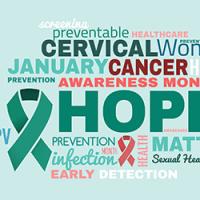
January is National Cervical Health Awareness Month – a time to raise awareness about cervical health, the importance of routine check-ups, and educate on the facts about cervical cancer.
The cervix is the narrow passage that forms the lower end of the uterus and although it is small, it is responsible for many important functions throughout the reproductive cycle. This small donut-shaped area is an amazing structure that protects the inside of the uterus, yet can also temporarily shrink away during labor to allow a fetus to pass through and be born. And while it has a big job to do, it can also carry risks of cervical cancer, which without routine checkups and exams, can go undetected.
“Anyone born with a cervix is potentially at risk for cervical cancer—women, trans men, some intersex individuals, and some people with other gender identities,” Melissa Hamrick, MD, Family Medicine says. Cervical cancer is the 7th most common cancer in the world and kills more than 300,000 people each year. In the USA, cervical cancer causes about 4,200 deaths annually.
Early Detection of Cervical Cancer
Routine annual gynecological exams are essential for your overall health and early cancer detection. During these exams, which are recommended from the age of 21, your provider will talk to you about risk factors, other health issues, and can offer two tests that help prevent cervical cancer and provide early detection. The Pap test (also called a Pap smear) looks for precancers – changing cells on the cervix that have the potential to become cancerous if untreated. The human papillomavirus (HPV) test looks for the virus that can cause cell changes that can lead to cervical cancer.
Nearly all cervical cancer is caused by HPV, a sexually transmitted infection virus. People can have HPV and spread the infection for years without showing any signs or symptoms. In addition to cervical cancer, HPV can also cause anal and throat cancers.
A Pap test is a simple test that should be pain-free when done by a skilled healthcare professional like your GRMDC Primary Care Provider (PCP). We take a small brush and use it on the cervix to collect a few cells which can be checked in a laboratory for abnormalities. The Pap test only looks for signs of cervical cancer and HPV, though, so it’s no substitute for regular checkups and other screenings your PCP might recommend.
“Pap tests have gotten more accurate in recent years because we can now test for high-risk types of HPV infection. We also know that many HPV infections, especially in people under 25 years old, resolve without treatment. For these reasons, we now recommend starting Paps at age 21 and doing them every 3 years if they are normal. Some low-risk individuals can even go 5 years between Paps after age 30—ask your PCP for more details,” Dr. Hamrick added.
Cervical Cancer Vaccines
There are now options to prevent infection with HPV, and thereby cervical cancer that is available to females and males. “The vaccine works best if it is given before a person ever has sex (before they have a chance to be exposed to the virus), so we recommend giving it in childhood, starting between 9-11 years old,” Dr. Hamrick added. There are numerous scientific studies that show the vaccine to be safe. Adults up to age 45 may also benefit from vaccination if they have not received it before—talk with your primary care physician for more information.
Symptoms of Cervical Cancer
In the early stages, there are little to no symptoms. And advanced stage can be misleading as it can cause bleeding or discharge, which may occur regularly for some women. If you have any signs or symptoms that seem out of the norm for you, it is important to see your doctor.
According to the CDC, cervical cancer is the easiest gynecological cancer to prevent through regular screenings and follow-up. “It is also highly curable when found and treated early.” Make 2020 the year you prioritize your health and schedule your annual gynecological appointment today.
